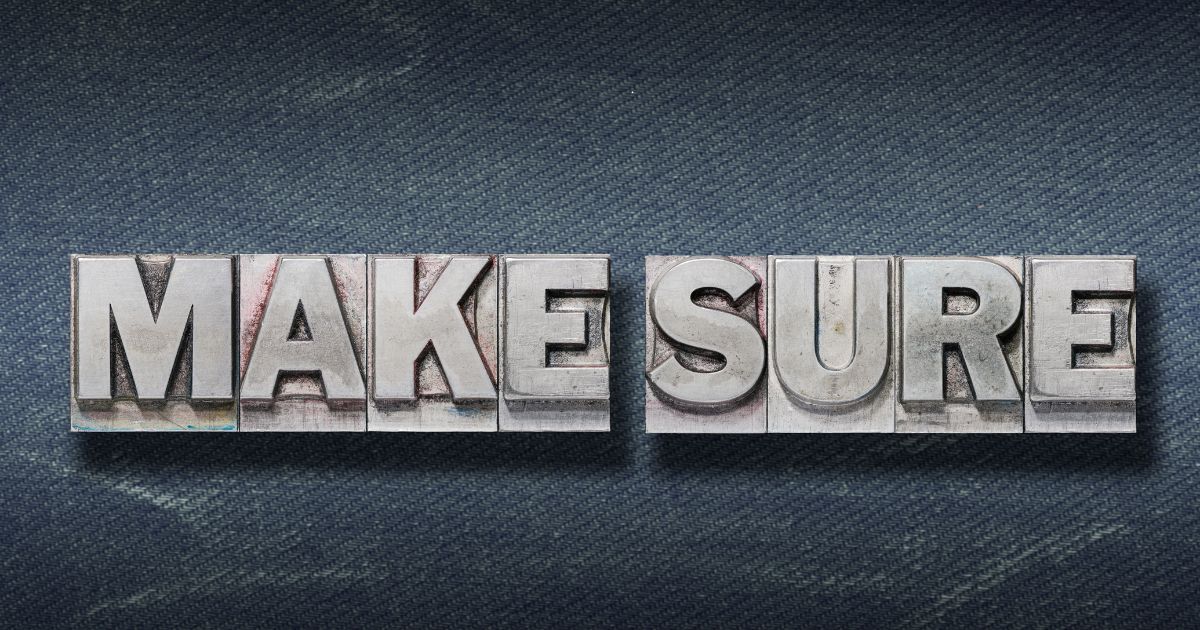“Make sure” is one of the most important phrases you use every day , but have you ever stopped to think about why? It’s all about being certain, avoiding mistakes, and taking responsibility. When you make sure something gets done right, you show care and focus. It’s how you get things done well and on time.
But did you know there are many ways to say make sure? Words like ensure, verify, or confirm can add clarity or make your message sound more professional. No matter which you choose, the key is simple: make sure everything is correct. Choosing the right phrase helps you communicate clearly and confidently. So always make sure your words match your goal , being precise, responsible, and trustworthy.
Other Ways to Say “Make Sure”
You can say ensure, verify, or confirm instead of make sure to express certainty. Words like double-check and ascertain add emphasis on careful review and investigation. These alternatives help vary your language while keeping your message clear and precise.
1. Ensure
Example: “Ensure that the safety measures are in place before starting the experiment.”
Meaning: To take responsibility for making sure something happens correctly. It highlights accountability and clarity in task performance.
Usage: Common in professional and formal contexts where accuracy and responsibility are essential.
2. Verify
Example: “Before publishing the report, verify all the facts with reliable sources.”
Meaning: To confirm the truth or accuracy of information through a validation process. It involves thorough research and inquiry.
Usage: Often used in journalism, research papers, and academic contexts where source reliability is crucial.
3. Confirm
Example: “Please confirm your attendance by replying to the confirmation email.”
Meaning: To provide a clear, official acknowledgment or affirmation of a fact or action.
Usage: Frequently found in everyday conversations and formal communication alike.
4. Ascertain
Example: “The detective sought to ascertain the suspect’s whereabouts during the incident.”
Meaning: To find out with certainty through investigation or inquiry. It involves thoroughness and precision.
Usage: Used in legal contexts and detailed investigative processes.
5. Double-check
Example: “Double-check the data entry to prevent any errors.”
Meaning: To review or re-examine something to catch mistakes and ensure accuracy.
Usage: Common in informal and professional settings to emphasize error prevention.
6. Guarantee
Example: “This warranty guarantees that the product will function as promised.”
Meaning: To make a firm promise or assurance about a result or performance.
Usage: Used in product assurance, contracts, and official documentation.
Read More: 15 Other Ways to Say “I’m Not in the Mood”
7. Affirm
Example: “The witness affirmed her statement during the court trial.”
Meaning: To state something confidently and publicly, often in a legal context.
Usage: Frequently used in legal and formal public statements.
8. Certify
Example: “The official body will certify that the student has met all course requirements.”
Meaning: To formally attest or confirm the truth of something, often with documentation.
Usage: Used in education, professional certification, and legal contexts.
9. Reassure
Example: “The leader reassured the public about the safety measures after the incident.”
Meaning: To comfort someone and restore their trust by addressing doubts or fears.
Usage: Common in public communication and situations involving uncertainty.
10. Validate
Example: “The scientist validated the hypothesis through a rigorous experiment.”
Meaning: To prove the truth or accuracy of a claim or idea via a validation process.
Usage: Typical in research papers and academic discussions.
11. Cross-check
Example: “Journalists cross-check sources to ensure the reliability of their reports.”
Meaning: To compare information from multiple sources for accuracy and trustworthiness.
Usage: Essential in journalism, research, and any context requiring verification.
12. Substantiate
Example: “The lawyer substantiated his client’s alibi with solid evidence.”
Meaning: To provide proof or evidence to support a claim or statement.
Usage: Common in legal, academic, and professional settings.
13. See to it
Example: “See to it that the documents are filed before the deadline.”
Meaning: To take responsibility for making sure a task is completed properly.
Usage: Used in both formal and informal communication, especially when delegating tasks.
14. Be certain
Example: “Be certain to turn off all equipment after use.”
Meaning: To have no doubt about an action or fact, emphasizing thoroughness and care.
Usage: Suitable for clear instructions in everyday conversations and professional settings.
When to Use Different “Make Sure” Alternatives
When you want to make sure something is done correctly, choosing the right alternative can boost clarity and professionalism. Use ensure or see to it when taking responsibility for task performance. Opt for verify, double-check, or cross-check when focusing on data accuracy or error prevention. In formal settings, confirm, certify, or affirm add precision and trust. Meanwhile, reassure works well to comfort or ease doubt. Selecting the right phrase depends on your context and the tone you want to convey.
In Professional Settings
In professional settings, it’s crucial to make sure every detail is accurate and tasks are completed responsibly. Use words like ensure and ascertain to show thoroughness and accountability. When accuracy matters, verify, confirm, and validate emphasize precision and trustworthiness. If you need to back a claim or provide proof, certify or substantiate fit perfectly. For delegating or overseeing tasks, see to it highlights responsibility. These alternatives help maintain clarity and professionalism in communication.
In Everyday Conversations
When chatting casually, it’s easy to make sure things get done without sounding too formal. Simple phrases like double-check and confirm keep the conversation natural and clear. You might reassure someone to ease their doubts or affirm a plan with confidence. Even saying be certain helps remind others to pay attention without sounding stiff. These alternatives fit well in everyday talk, making your message friendly and easy to understand.
In Academic or Research Contexts
In academic or research settings, it’s crucial to make sure your work is precise and credible. Terms like verify, validate, and ascertain highlight the importance of thorough investigation and accuracy. Researchers often cross-check data and substantiate claims with solid evidence. Using these alternatives emphasizes the rigorous process behind findings and supports the credibility of your work. This careful language helps maintain clarity and professionalism in research papers and scientific discussions.
Conclusion
To wrap up, make sure you always choose the right words when you want to make sure your message is clear. Saying make sure helps you show that you care about details and want things done properly. You must be careful with your words because they carry meaning. When you make sure to use the best phrase, people understand you better.
In both casual talks and professional talks, you must make sure your language fits the situation. You can say make sure in many ways, but the goal stays the same: to be certain and avoid mistakes. Always make sure to double-check your work and confirm facts. This way, you build trust and show responsibility. So, whenever you speak or write, make sure to pick your words carefully. This helps you communicate clearly and get the best results.
FAQ’s
What does make sure mean?
Make sure means to be certain that something happens or is done correctly. You use make sure to avoid errors and confirm details.
When should I use make sure?
You should use make sure when you want to remind someone to check or confirm something carefully. Make sure helps emphasize responsibility.
Are there other ways to say make sure?
Yes, many words like ensure, verify, and confirm can replace make sure. Each fits different situations but all mean to check or guarantee.
How do I use make sure in professional settings?
In professional settings, make sure is key to stress accuracy and responsibility. Always make sure to review your work before submitting.
Can I use make sure in everyday talk?
Yes, make sure is common in daily conversations. Use make sure to gently remind or warn someone to be careful or check something.

Grammerroot is your trusted source for mastering English grammar and language skills. From simple rules to advanced tips, we help learners build strong foundations through easy-to-understand content. Learn smart, learn right — only at Grammer Root.




